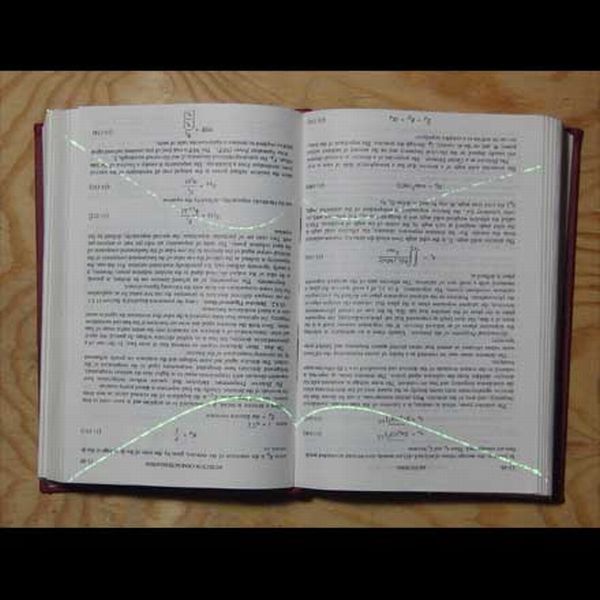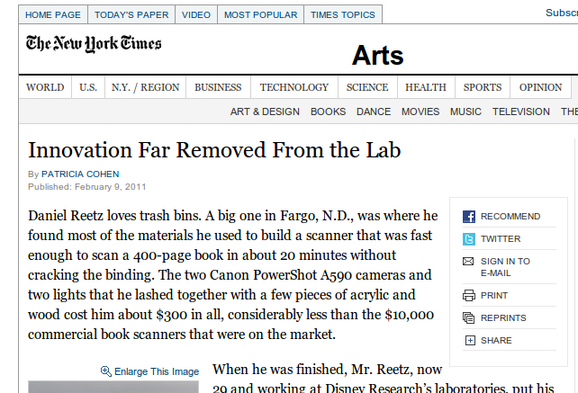So, uhh, I/my project made it into the print edition of the New York Times today, February 10th. Page C1 – Arts:
https://www.nytimes.com/2011/02/10/arts/10innovative.html?src=twrhp
I am proud to be called part of the “dark matter of innovation”.
I must correct one crucial fact – more than 250 people have built DIY Book Scanners – and I’m also aware of a whole shadow world of scanner builders who never join the forum and share (they show up on Craigslist and in other forums and websites every other day or so). My estimate on the total number of builds, documented and undocumented, completed and left unfinished, is between 350 and 500. DIYBookScanner.org (the site where the action happens) has been around for ~600 days, so that’s quite a few builds.
Well, hell. Life is good. The book scanner project is going gangbusters. We have not one, but two of the best open source book
scanning applications out there (Scan Tailor and Book Scan Wizard, both GPL) which are being actively developed, improved, and community supported. Scan Tailor, in particular, has the best text-based dewarping ever implemented in free software. We have three community-developed open source ways to bind digital books (Bindery, DJVUBind, and PDFmaker), and we have a ton of hardware innovation going on. On the hardware front, we decided to try to see how little hardware we can use – so we’re co-developing hardware and software to use laser beams to “dewarp” (flatten) the images of book pages. Our first results came within hours of trying things out… and things look great. If this method reaches anything near the potential we’re seeing now, in the near future we could go from a $300 high speed book scanner made from trash to a $30 high speed book scanner made in the
USA – that fits in your handbag.

In the last year my community has helped out in Haiti, Africa, Canada, Indonesia, and all over the States. By “helped out” I mean offering advice, money, hardware, software, ongoing support, and even in-person meetups in Portland, OR (and elsewhere). We have substantial representation all over the world – particularly in Brazil (you should see these guys innovate), Germany (builders of auto page turners!), and Russia (a place where camera-based book scanning has been going on for over 40 years – the original DIY’ers). You can’t search for book scanning without finding us, because we’ve tried or seen almost everything out there, shared our experiences, and improved it as a collective effort. That said, sometimes finding what you want in our forums is a pain in the ass. I’m working on it.
As the founder and steward of this project, I often wonder how long book scanning will seem as important as it does now, in this pivotal moment of books gone bits. While once, I thought these thoughts cynically, I now think the same thoughts — differently. We are creating the future of personal document digitization, making it easy, free, and powerful — as it should be — and using things and skills that people already have. Someday, I hope, it will not be a big deal or seem so important, because it will be 1. freely available to anyone and 2. just a baseline expectation, like the free and simple use of printers and phone-cams is today.
Maybe I’m wrong. It’s hard to avoid such grandiose thoughts when you see a thousand people working together toward a common goal, each in their own way, on their own terms, in their own time, and according to their ever-rising ability. Maybe another technology will come along and disrupt our innovation, making things even easier, cheaper, faster, and more accessible.
I’d be glad to see that happen.
Thanks for your time.
Daniel

6 Responses to Daniel Reetz in the New York Times